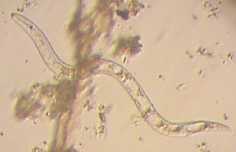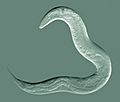Caenorhabditis elegans facts for kids
Quick facts for kids Caenorhabditis elegans |
|
|---|---|
 |
|
| An adult hermaphrodite C. elegans worm | |
| Scientific classification | |
| Kingdom: | |
| Phylum: | |
| Class: |
Chromadorea
|
| Order: |
Rhabditida
|
| Family: |
Rhabditidae
|
| Genus: |
Caenorhabditis
|
| Species: |
C. elegans
|
| Binomial name | |
| Caenorhabditis elegans (Maupas, 1900)
|
|
| Subspecies | |
Caenorhabditis elegans (say: SEE-no-rab-DYE-tis EL-uh-ganz), often called C. elegans, is a tiny type of roundworm or nematode. It is very important to scientists. They use it a lot to learn about genetics and how living things grow and change.
This worm is only about 1 millimeter long, which is super small! C. elegans worms are not parasites. This means they do not live inside other animals. Instead, they live freely in the soil. They eat tiny living things like bacteria. Scientists call C. elegans a "model organism". This means it is a great example to study how animals grow and behave. It was the first multicellular organism (an animal made of many cells) whose entire genome was mapped. The genome is like a complete instruction book for building the worm.
Contents
About C. elegans
What C. elegans Looks Like
C. elegans is a very small worm. It is so tiny you need a microscope to see it well. It has a simple body but is still a complex animal. It has muscles, a nervous system, and a gut.
How C. elegans Lives
These worms live in soil all over the world. They especially like rotting fruit and compost piles. This is where they can find lots of bacteria to eat. They are very common in nature.
Reproduction and Life Cycle
C. elegans has two types of sex: hermaphrodites and males.
- A hermaphrodite is a worm that can make both sperm and eggs. It makes sperm when it is young, like a larva. Then, as an adult, it makes eggs. Hermaphrodites can fertilize their own eggs.
- A male worm can only make sperm. Males are a bit smaller than hermaphrodites.
When a hermaphrodite fertilizes its own eggs, it produces offspring that are mostly hermaphrodites. If a male mates with a hermaphrodite, they can produce both males and hermaphrodites.
Fast Growth and Development
C. elegans grows very quickly. At a warm temperature of 25 degrees Celsius (77 degrees Fahrenheit), an embryo (a very young worm) takes only about 14 hours to develop. This fast growth makes them perfect for studying how animals develop from a single cell.
Why Scientists Study C. elegans
Scientists started studying C. elegans in 1965. A scientist named Sydney Brenner began this important work. These worms are easy to keep alive in laboratories. They don't need much space or special food. Animals that grow fast and are easy to care for are often excellent for research.
Understanding Genes and Cells
Scientists have learned a lot about how genes work by studying C. elegans. They have found out how genes control how the worm grows. They also learned how genes tell some cells to die in a controlled way. This process is called "programmed cell death." It is a normal and important part of development for many animals, including humans.
Nobel Prize Discovery
In 2002, three scientists won the Nobel Prize in Physiology or Medicine. They were Sydney Brenner, Robert Horvitz, and John Sulston. They won for their amazing work with C. elegans. Their research showed how specific genes control organ development and programmed cell death. This discovery helped us understand many diseases, like cancer.
Images for kids
See also
 In Spanish: Caenorhabditis elegans para niños
In Spanish: Caenorhabditis elegans para niños
 | Delilah Pierce |
 | Gordon Parks |
 | Augusta Savage |
 | Charles Ethan Porter |





